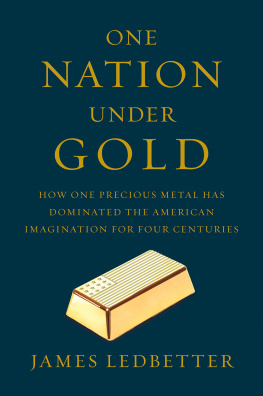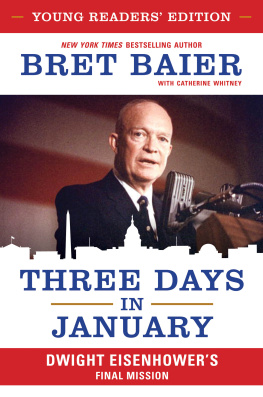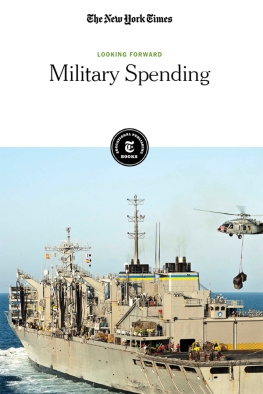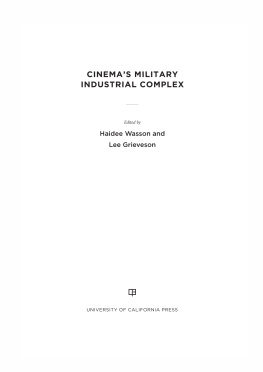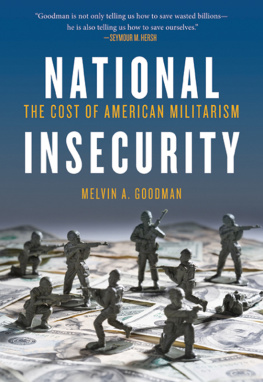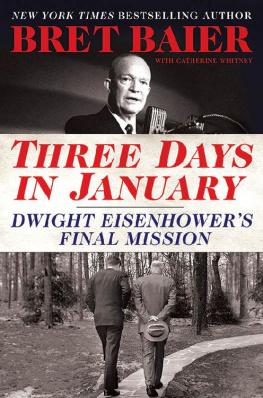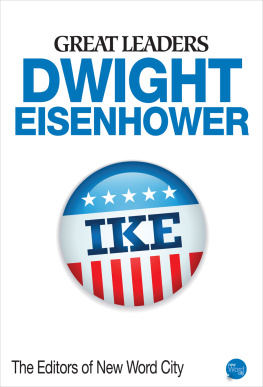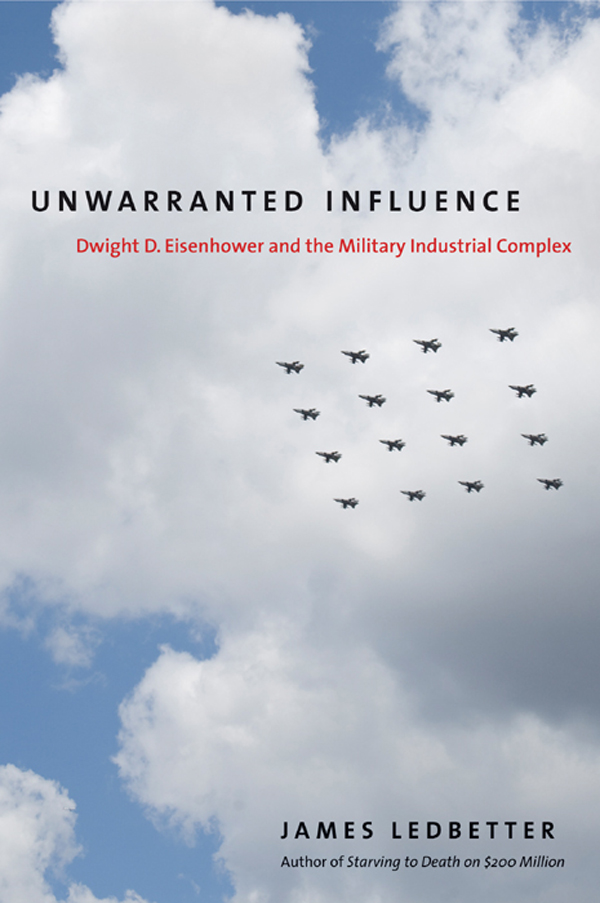Yale UNIVERSITY PRESS NEW HAVEN & LONDON
Unwarranted Influence

Unwarranted
Influence
Dwight D. Eisenhower
and the Military
Industrial Complex
James Ledbetter
Copyright 2011 by James Ledbetter.
All rights reserved.
This book may not be reproduced, in whole or in part, including illustrations,
in any form (beyond that copying permitted by Sections 107 and 108 of the
U.S. Copyright Law and except by reviewers for the public press),
without written permission from the publishers.
Yale University Press books may be purchased in quantity for educational, business, or promotional use. For information, please e-mail (U.K. office).
Set in Janson type by Integrated Publishing Solutions, Grand Rapids, Michigan.
Printed in the United States of America by Sheridan Books, Ann Arbor, Michigan.
Library of Congress Cataloging-in-Publication Data
Ledbetter, James.
Unwarranted Influence : Dwight D. Eisenhower and the military-industrial
complex / James Ledbetter.
p. cm. (Icons of America)
Includes bibiographical references and index.
ISBN 978-0-300-15305-7 (hardcover : alk. paper)
1.Military-industrial complexUnited StatesHistory 20th century.
2.Civil-military relationsUnited StatesHistory 20th century.
3.Eisenhower, Dwight D. (Dwight David), 18901969.I.Title.
HC110.D4L4 2011
355.02130973dc222010024512
A catalogue record for this book is available from the British Library.
This paper meets the requirements of ANSI/NISO Z39.48-1992
(Permanence of Paper).
10987654321
ICONS OF AMERICA
Mark Crispin Miller, Series Editor
Icons of America is a series of short works written by leading scholars, critics, and writers, each of whom tells a new and innovative story about American history and culture through the lens of a single iconic individual, event, object, or cultural phenomenon.
The Big House
S TEPHEN C OX
Andy Warhol
A RTHUR C. D ANTO
Our Hero: Superman on Earth
T OM D E H AVEN
Fred Astaire
J OSEPH E PSTEIN
Wall Street: Americas Dream Palace
S TEVE F RASER
No Such Thing as Silence:
John Cages 4'33"
K YLE G ANN
Frankly, My Dear: Gone with
the Wind Revisited
M OLLY H ASKELL
Alger Hiss and the Battle for History
S USAN J ACOBY
Nearest Thing to Heaven:
The Empire State Building
and American Dreams
M ARK K INGWELL
The Liberty Bell
G ARY N ASH
The Hamburger: A History
J OSH O ZERSKY
Gypsy: The Art of the Tease
R ACHEL S HTEIR
Kings Dream
E RIC J. S UNDQUIST
Inventing a Nation: Washington, Adams, Jefferson
G ORE V IDAL
Small Wonder: The Little Red Schoolhouse in History and Memory
J ONATHAN Z IMMERMAN
Contents
ONE
Tracking the Unwarranted Influence
TWO
Intellectual Origins
THREE
War, Peace, and Eisenhower
FOUR
Eisenhowers Contentious Second Term
FIVE
The Speech
SIX
Interpretations and Embellishments
SEVEN
In Full Fury
EIGHT
Eisenhower Must Be Rolling Over in His Grave
APPENDIX
Eisenhowers Farewell Address
Acknowledgments
The man who most made this book possible is Jonathan Brent, former editorial director at Yale University Press and now executive director and CEO of the YIVO Institute for Jewish Research. Over an engaging lunch, Jonathan not only grasped how this topic merited its own book but offered several penetrating insights that shaped how I approached my research and writing. His successor at Yale University Press, William Frucht, gave the manuscript a thoughtful and disciplined edit, banishing my more academic constructions. And production editor Jack Borrebach was indispensable in helping to organize the text and shepherd it to print.
Amy Tennery applied her dogged reporting skills to helping with some of the research. Sara E. Berndt was able to provide a crucial document on a tight deadline. Mark Gimein was generous enough to read the draft manuscript and provide key criticisms and suggestions. Stephen Hess and Charles Griffin were gracious with their recollections and insights.
Of the many things I owe my literary agent Chris Calhoun, one of them is my deep gratitude for suggesting that I come up with ideas for Yales Icons of America series. The entire project has been rewarding, from the initial brainstorming through the research and the final publication. The entire staff at the Eisenhower Presidential Library was friendly and helpful, but this book has especially benefited from the aid and scholarship of James W. Leyerzapf. I have also been ably aided by the staff at Columbia Universitys Oral History Research Office; by the Special Collections Staff at UCLAs Charles Young Library; and, most consistently, at the New York Public Library.
Most of all I thank my wife, Erinn Bucklan, whose enthusiasm and encouragement enrich my writing more than she can know.

ONE
Tracking the Unwarranted Influence
That Dwight David Eisenhower should be rememberedx for any speech at allparticularly one delivered late in his lifeis something of a wonder. A world-renowned general, an Ivy League college president, an undefeated politician, and even a best-selling author, he was nonetheless not a great orator. Particularly after the 1955 heart attack and 1957 stroke he suffered, Eisenhower was known as a rambling, bumbling public speaker, especially when speaking without notes; in his press conference responses he often trailed off into half-sentences and non sequiturs. While some have suggested that he did so strategically, it is clear that much of his oratorical clumsiness was beyond his control. He once explained the effect of his
This is not to say that Eisenhower did not give significant, even great speeches. A few days before Election Day in 1952, he brilliantly encapsulated his authority on foreign policy and his predecessors inaction with a simple, decisive (and cannily vague) statement: I shall go to Korea. His sweeping Chance for Peace speech, delivered in 1953 in the wake of Joseph Stalins death, had a dramatic worldwide impact. Even if, as many have maintained, its purpose was largely propagandistic, the text remains one of the seminal arguments against the expense and absurdity of a nuclear arms race. A somewhat related 1953 speech, often called Atoms for Peace, is a rhetorical gem that has been closely examined for its multifaceted messages about Cold War strategy.
Only one of Eisenhowers speeches, the one he gave just before he left the White House in 1961, has earned a permanent place in the public memory. Like any important address, it contained multiple messages and nuances, but its fame rests on a single sentence: In the councils of government, we must guard against the acquisition of unwarranted influence, whether sought or unsought, by the military-industrial complex.
How has it happened that this rather dark sentence contains the most-cited words of a man who towered over American public life for some twenty years? This instance of historical concisionsome might say elisionis remarkable for a variety of reasons. First, when thinking of memorable phrases from American presidents, the nonhistorian can rarely recall anything that presidents said upon leaving office. The most notable exception is Washingtons farewell speech, which, as schoolchildren are taught, warned against permanent alliances. But most easily recalled presidential addresses draw their power from some other situation than departure. Lincolns Gettysburg Address and FDRs rendezvous with destiny request for congressional action are memorable in large part as expressions of leadership during wartime. John F. Kennedy set the bar high for speeches of exhortation with his inaugural challenge to Americans to ask not what your country can do for youask what you can do for your country. Books have been published about Jimmy Carters malaise speech and Ronald Reagans demand at the Bran-denburg Gate: Mr. Gorbachev, tear down this wall.


